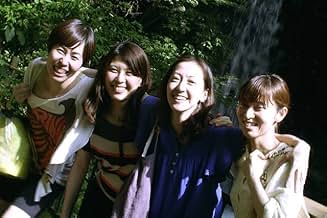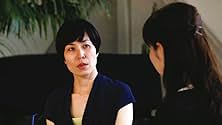VALUTAZIONE IMDb
7,6/10
3201
LA TUA VALUTAZIONE
Un'epopea a combustione lenta che racconta il viaggio emotivo di quattro trentenni nella nebbiosa città di mare di Kobe.Un'epopea a combustione lenta che racconta il viaggio emotivo di quattro trentenni nella nebbiosa città di mare di Kobe.Un'epopea a combustione lenta che racconta il viaggio emotivo di quattro trentenni nella nebbiosa città di mare di Kobe.
- Regia
- Sceneggiatura
- Star
- Premi
- 6 vittorie e 5 candidature totali
Recensioni in evidenza
Binged this 317-minute realistic drama about four female friends who come to grips with their feelings of doubt and disappointment as they enter middle age, in particular with the relational shortcomings of men. The slow, detailed narrative, with its prolonged scenes and interwoven story lines around a centering drama and unique structural elegance, mesmerized me. This is rare, meaty fare far afield from the happily-ever-after screenplays that are all too common among Japanese movies, at least the ones I've watched heretofore on Amazon Prime.
10linistea
Giving a feeling of Bergman meets Romer, this movie is very intimate, and quietly leaves deep traces for long after seeing it. About the ambiguity of love, power of friendship, transformation and intimacy, an emotional journey.
Through 4 different characters, the movie make us share the life of today Japan, and the legitimate questions you can encounter in your couple. Necessarily slow, it is a good movie to make us think about our life.
True and accurate insight in the woman soul. To be watched in a quiet place.
There are various films whose run-times are much longer than what is considered normal. Lawrence Of Arabia clocked in at 397 minutes. The Lord Of The Rings: The Return Of The King was over 200 minutes long. More recently Blade Runner 2049 clocked in at a 'mere' 164 minutes. Japanese cinema has had its share of longer movies too. The epic Seven Samurai was 207 minutes long, while Love Exposure stopped looking up just shy of the four-hour mark. Happy Hour, ironically given the title, clocks in at five hours and seventeen minutes. Even more irony is supplied courtesy of the 'happy' aspect of things. More on that later.
What the five hours length offers the viewer is a film that has the space, at what seems like the natural tempo of life, to dwell on the details, subtleties, nuances; delve into the minutiae and the corners of lives of the four female characters. They comprise the portrayals director Hamaguchi Ryûsuke intends his film, and its novice actresses, to deliver. The film is set in Kobe, Japan and makes all women look seamlessly bad. The director sets out to show not one woman as honourable or decent. When the four women run into other females the latter too end up accusatory, suspicious, corrupt and rotten. That over five hours was needed is in part because so much realism is portrayed and in part because the film aims to not be a mere movie, but to act like an unglamorous eye on the perfidy of the modern woman abusing her freedom with abandon. The realism is accentuated because the actresses are all from the director's acting workshops - none of them have any other acting credit to her name - which means their relative amateurism and occasional awkwardness makes their corruption come across as even more genuine. Even on the unintentionally rare occasion that the camera is out of focus and blurry or a fly spontaneously lands and re-lands on a character's head it ends up giving the movie even more authenticity as it helps the proceedings appear true-to-life. The same, one imagines, is true with the film going on for so long that the actors forget they are on film, forget the camera and just relax and become themselves.
A segment of contemporary Japanese films (Kamome Shokodu, Megane, Petaru Dansu, Tokyo Sora as examples) has garnered accusations of catering to the desexualisation of Japanese women who are accorded a distant and sometimes demented quality. In films like these men are incidental and, when present at all, merely there as inane plot device creatures who help the women and immediately revert to disposability. These women's newfound independence has not enhanced them with love, understanding, happiness or contentment, but unleashed a beast that is morally rudderless, yet unwilling to assume ownership. In these films, the woman is deliberately indifferent to everything except her declared impossible standards. Happy Hour takes the concept to the next level. Men are not incidental. Men are victimized and suffering at the hands of not indifferent, but outright cruel and unhinged malicious female characters who not only not see it that way, they actually believe the opposite is true. Of the four females, one is married, one is divorcing, one is already divorced and the other in flux. Each is in turn abusive towards her man to the extent that in the second half of the film the viewer is treated to evidence of despicable and duplicitous deeds by women whose selfishness is projected through extraordinary demands, insults, psychological demasculinization and actions. Not only the women behave as such, but worse they imagine themselves as the victims. Ironically, they are more accommodating to men who are not physically or psychologically protective of them. One's family, vows, norms - even female friends - and propriety be damned. These women are uniformly hostile and self-absorbed jerks to such an extent that in comparison a fifth woman who characterizes her father's protectiveness towards her as a child as the work of a serial liar and a sixth woman who expresses her love and lust to a married man - right after a dinner with the said man's wife - are the more decent ones. There has been some thought given recently that in contrast to conventional wisdom Japan is a matriarchy. This is not the place for that debate, but in Happy Hour the demanding four use accusatory language to reveal surreal selfishness. It is unfathomable how they do not communicate their outlandish wants, yet demand understanding. They receive love, loyalty, patience and material goods, yet none of it helps tether them to husband or child, feeling or logic. It is a straight road to wanton matrimonial and societal hell.
Irony has come up a few times in this text. In addition, it is ironic that there is little 'happy' (the title stems from a lengthy and revealing café scene after a workshop where the characters are encouraged to find their centres and communicate, the latter of which the viewer must by this point in this text know is useless) in this film other than the brief times the four women find themselves away from home, responsibility or committed male companionship. What the viewer gets in lieu, however, is something original, something curious, something novel, but never uplifting or inspiring.
During one seemingly throw-away shot we are treated to a view of the city from the above inclusive of its streets, alleys, houses and yards. We come away wondering at the misery that lies within especially now that we know all the normal tools of human affection, logic or persuasion have lost their efficacy.
What the five hours length offers the viewer is a film that has the space, at what seems like the natural tempo of life, to dwell on the details, subtleties, nuances; delve into the minutiae and the corners of lives of the four female characters. They comprise the portrayals director Hamaguchi Ryûsuke intends his film, and its novice actresses, to deliver. The film is set in Kobe, Japan and makes all women look seamlessly bad. The director sets out to show not one woman as honourable or decent. When the four women run into other females the latter too end up accusatory, suspicious, corrupt and rotten. That over five hours was needed is in part because so much realism is portrayed and in part because the film aims to not be a mere movie, but to act like an unglamorous eye on the perfidy of the modern woman abusing her freedom with abandon. The realism is accentuated because the actresses are all from the director's acting workshops - none of them have any other acting credit to her name - which means their relative amateurism and occasional awkwardness makes their corruption come across as even more genuine. Even on the unintentionally rare occasion that the camera is out of focus and blurry or a fly spontaneously lands and re-lands on a character's head it ends up giving the movie even more authenticity as it helps the proceedings appear true-to-life. The same, one imagines, is true with the film going on for so long that the actors forget they are on film, forget the camera and just relax and become themselves.
A segment of contemporary Japanese films (Kamome Shokodu, Megane, Petaru Dansu, Tokyo Sora as examples) has garnered accusations of catering to the desexualisation of Japanese women who are accorded a distant and sometimes demented quality. In films like these men are incidental and, when present at all, merely there as inane plot device creatures who help the women and immediately revert to disposability. These women's newfound independence has not enhanced them with love, understanding, happiness or contentment, but unleashed a beast that is morally rudderless, yet unwilling to assume ownership. In these films, the woman is deliberately indifferent to everything except her declared impossible standards. Happy Hour takes the concept to the next level. Men are not incidental. Men are victimized and suffering at the hands of not indifferent, but outright cruel and unhinged malicious female characters who not only not see it that way, they actually believe the opposite is true. Of the four females, one is married, one is divorcing, one is already divorced and the other in flux. Each is in turn abusive towards her man to the extent that in the second half of the film the viewer is treated to evidence of despicable and duplicitous deeds by women whose selfishness is projected through extraordinary demands, insults, psychological demasculinization and actions. Not only the women behave as such, but worse they imagine themselves as the victims. Ironically, they are more accommodating to men who are not physically or psychologically protective of them. One's family, vows, norms - even female friends - and propriety be damned. These women are uniformly hostile and self-absorbed jerks to such an extent that in comparison a fifth woman who characterizes her father's protectiveness towards her as a child as the work of a serial liar and a sixth woman who expresses her love and lust to a married man - right after a dinner with the said man's wife - are the more decent ones. There has been some thought given recently that in contrast to conventional wisdom Japan is a matriarchy. This is not the place for that debate, but in Happy Hour the demanding four use accusatory language to reveal surreal selfishness. It is unfathomable how they do not communicate their outlandish wants, yet demand understanding. They receive love, loyalty, patience and material goods, yet none of it helps tether them to husband or child, feeling or logic. It is a straight road to wanton matrimonial and societal hell.
Irony has come up a few times in this text. In addition, it is ironic that there is little 'happy' (the title stems from a lengthy and revealing café scene after a workshop where the characters are encouraged to find their centres and communicate, the latter of which the viewer must by this point in this text know is useless) in this film other than the brief times the four women find themselves away from home, responsibility or committed male companionship. What the viewer gets in lieu, however, is something original, something curious, something novel, but never uplifting or inspiring.
During one seemingly throw-away shot we are treated to a view of the city from the above inclusive of its streets, alleys, houses and yards. We come away wondering at the misery that lies within especially now that we know all the normal tools of human affection, logic or persuasion have lost their efficacy.
This starts out as a really interesting movie about four Japanese 30ish women and how they (mis)manage their lives and the lives of those around them in search of things we are never quite sure of. The film is very good at bringing you close to their world, but keeping you at arms length at the same time, and the characters take turns in being more or less likeable/relatable, but often come off as aliens floating through contemporary Japanese society and trying to communicate (or not- "communication" is the key theme).
I don't know the reality of said society, but I have met enough alienated and unhappy people in my own to suggest it rings true, specific cultural issues non-withstanding. That part of the movie was fascinating, including insights into family, divorce, relationships, honor, etc.
But the issue is not really the five-hour length, probably used to suggest the real-life unwinding of issues; although it doesn't help. For me the main problem was the long expository conversations/monologues, the many side stories and secondary characters popping in and out, the serious issues that come up with no background (that they have often no resolution is fine by me), and the fact the the actors often seem more part of an acting experiment using amateurs, than players in a movie, which actually seems to be the case. Most actors do a fine job (some are more wooden), but it does feel like an exercise.
As a "completist" that watches all movies to the end on principle, I nevertheless felt I would have gotten the same messages by watching any 90-120 minutes of the whole length.
Lo sapevi?
- QuizIn France, the film was released theatrically in three parts over three weeks, respectively dubbed "1&2", "3&4" and "5". The film was thus advertised as "The First Cinema TV Series".
I più visti
Accedi per valutare e creare un elenco di titoli salvati per ottenere consigli personalizzati
- How long is Happy Hour?Powered by Alexa
Dettagli
Botteghino
- Lordo in tutto il mondo
- 337.256 USD
- Tempo di esecuzione5 ore 17 minuti
- Colore
- Proporzioni
- 1.85 : 1
Contribuisci a questa pagina
Suggerisci una modifica o aggiungi i contenuti mancanti

Divario superiore
By what name was Happy Hour (2015) officially released in Canada in French?
Rispondi


















